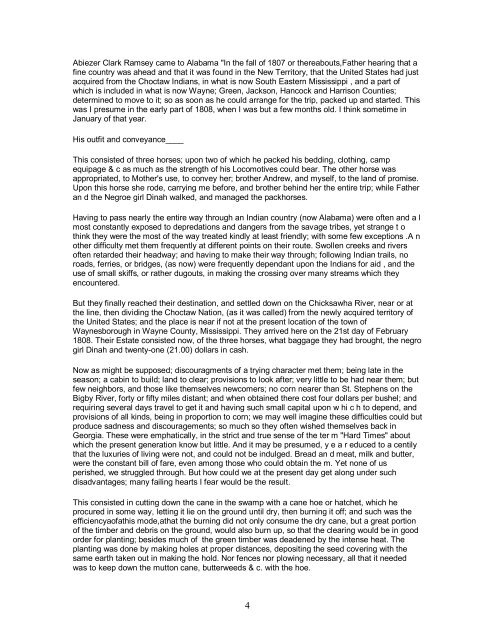You also want an ePaper? Increase the reach of your titles
YUMPU automatically turns print PDFs into web optimized ePapers that Google loves.
Abiezer Clark <strong>Ramsey</strong> came to Alabama "In the fall of 1807 or thereabouts,Father hearing that a<br />
fine country was ahead and that it was found in the New Territory, that the United States had just<br />
acquired from the Choctaw Indians, in what is now South Eastern Mississippi , and a part of<br />
which is included in what is now Wayne; Green, Jackson, Hancock and Harrison Counties;<br />
determined to move to it; so as soon as he could arrange for the trip, packed up and started. This<br />
was I presume in the early part of 1808, when I was but a few months old. I think sometime in<br />
January of that year.<br />
His outfit and conveyance____<br />
This consisted of three horses; upon two of which he packed his bedding, clothing, camp<br />
equipage & c as much as the strength of his Locomotives could bear. The other horse was<br />
appropriated, to Mother's use, to convey her; brother Andrew, and myself, to the land of promise.<br />
Upon this horse she rode, carrying me before, and brother behind her the entire trip; while Father<br />
an d the Negroe girl Dinah walked, and managed the packhorses.<br />
Having to pass nearly the entire way through an Indian country (now Alabama) were often and a l<br />
most constantly exposed to depredations and dangers from the savage tribes, yet strange t o<br />
think they were the most of the way treated kindly at least friendly; with some few exceptions .A n<br />
other difficulty met them frequently at different points on their route. Swollen creeks and rivers<br />
often retarded their headway; and having to make their way through; following Indian trails, no<br />
roads, ferries, or bridges, (as now) were frequently dependant upon the Indians for aid , and the<br />
use of small skiffs, or rather dugouts, in making the crossing over many streams which they<br />
encountered.<br />
But they finally reached their destination, and settled down on the Chicksawha River, near or at<br />
the line, then dividing the Choctaw Nation, (as it was called) from the newly acquired territory of<br />
the United States; and the place is near if not at the present location of the town of<br />
Waynesborough in Wayne County, Mississippi. They arrived here on the 21st day of February<br />
1808. Their Estate consisted now, of the three horses, what baggage they had brought, the negro<br />
girl Dinah and twenty-one (21.00) dollars in cash.<br />
Now as might be supposed; discouragments of a trying character met them; being late in the<br />
season; a cabin to build; land to clear; provisions to look after; very little to be had near them; but<br />
few neighbors, and those like themselves newcomers; no corn nearer than St. Stephens on the<br />
Bigby River, forty or fifty miles distant; and when obtained there cost four dollars per bushel; and<br />
requiring several days travel to get it and having such small capital upon w hi c h to depend, and<br />
provisions of all kinds, being in proportion to corn; we may well imagine these difficulties could but<br />
produce sadness and discouragements; so much so they often wished themselves back in<br />
Georgia. These were emphatically, in the strict and true sense of the ter m "Hard Times" about<br />
which the present generation know but little. And it may be presumed, y e a r educed to a centily<br />
that the luxuries of living were not, and could not be indulged. Bread an d meat, milk and butter,<br />
were the constant bill of fare, even among those who could obtain the m. Yet none of us<br />
perished, we struggled through. But how could we at the present day get along under such<br />
disadvantages; many failing hearts I fear would be the result.<br />
This consisted in cutting down the cane in the swamp with a cane hoe or hatchet, which he<br />
procured in some way, letting it lie on the ground until dry, then burning it off; and such was the<br />
efficiencyaofathis mode,athat the burning did not only consume the dry cane, but a great portion<br />
of the timber and debris on the ground, would also burn up, so that the clearing would be in good<br />
order for planting; besides much of the green timber was deadened by the intense heat. The<br />
planting was done by making holes at proper distances, depositing the seed covering with the<br />
same earth taken out in making the hold. Nor fences nor plowing necessary, all that it needed<br />
was to keep down the mutton cane, butterweeds & c. with the hoe.<br />
4


